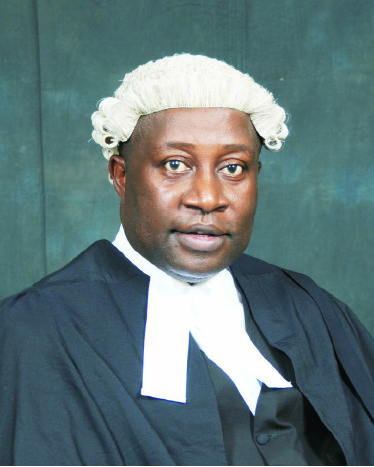Emeka Etiaba, a Senior Advocate of Nigeria (SAN), in this interview with Senior Correspondent, ONYEWUCHI OJINNAKA, speaks on the recent judgment of Osun State High Court on wearing of hijab by female Muslim students to public schools, the judiciary, among other issues.
What is your position on the criticisms trailing the judgment of an Osun State High Court on the issue of wearing hijab to public schools by female Muslim students?
Governor Rauf Aregbesola’s decision and the court’s decision will take the people of Osun State back to the Dark Ages. We are talking about looking for money to pay salaries. Every state is talking about how to go back to agriculture, how to encourage young entrepreneurs, how to industrialise the states. And in a state where salaries are owed, the focus is no longer how to pay salaries and improve on the internally-generated revenue (IGR) of the state, they are talking about hijab and that is the legacy he has decided to bequeath as his tenure runs to an end. It is very sad.
The other day, I saw in the newspapers the Christians, some wore their choir robes, and others wore white (nuns’) gowns. That is what we called a state of anomie, a state where nobody is in control. That is what he has foisted on the state. I hope he will look beyond party lines. I know how the state worked before he took over. I know how hard the former governor, Olagunsoye Oyinlola, worked to position the state and I know how bad the state has gone back now.
What is your take on the forthcoming Nigerian Bar Association (NBA) election?
My take on it is that the Nigerian Bar Association is always leading the way positively. That is a very good one. At least, for the first time, every lawyer is entitled to vote in the election; it is no longer a delegate type of election where a few people determine the future of the entire people. So I see it as a welcome development, and beyond the issue of e-voting comes the achievements of the present NBA administration with the reasonable innovations which hitherto were thought impossible.
For example, the use of ‘stamp and seal’ which has actually gone a long way in weeding out fake lawyers. Before now, fake lawyers were able to pay practising fees, come to court, carry on while some of us never knew they were non-lawyers until the issue of ‘stamp and seal’ came. The NBA administration has done well. The identity (ID) cards are out for the first time; a lawyer has ID card given to him by the Bar Association, the branch where he practices. The regime has done well. The plan for succession is also going on well by the introduction of this mode of election.
What is your assessment of the two presidential contenders, Joe Kyari-Gadzama and Abubakar Balarabe Mahmoud, both senior advocates?
The problems we have with Nigerians and the electoral process, most times, is that people are appealed to, to run for election. Reluctant candidates contest election, and most times they win because some interests, power blocs, feel that such characters can be manipulated; hence they are convinced to come out and run for election. But what we are seeing in the NBA election is that you have two people who are desirous on their own to contest the election; the two people who have manifested their interests. The two people who have come out have the capacity to lead the Bar. So I am impressed.
What is your assessment of the nation’s judiciary?
The judiciary in Nigeria has not done badly. The judicial system is within the larger system called Nigeria, and the judges are Nigerians; they are not from the moon. Going by the rot you find in Nigeria, I can tell you the judiciary has done extremely well. And if you ask me whether there is need for improvement, I will say yes. And when people talk, they talk as if the judiciary has not been self-cleansing. In the past six months, I can tell you how many judges that have been disciplined; quite a lot of judges. But people do not look at this. People judge the judiciary based on how judgment that comes from there affects them. I will give you an example. Take a look at the Supreme Court decision in the governorship elections in Nigeria. Certain people from certain persuasions felt that the judiciary has not done well; they felt the Supreme Court has not been fair to all. But what they failed to look at are the principles with which the Supreme Court founded its judgments.
The Supreme Court founded its judgments on certain principles and nobody has accused them of deviating from those principles. Rather, they will say in Akwa Ibom State, they gave it to the Peoples Democratic Party (PDP); in Rivers State, they gave it to PDP; in Abia State, they gave it to PDP. They have not said whether they deviated from those principles that they, as court, settled.
People will always comment on the judiciary based on where they stand, and I do not waste my time with such people. At times, you also find people who assess the judiciary out of bad faith, some out of ignorance. A lawyer who has not gone to court in over 20 years now has the idea which judgment is correct or not correct, from which knowledge of law? Basically, we have to see beyond the smokescreen. The judiciary has done well, even where there are lapses, they have been cleansing themselves.
How can the war on corruption be fought and won?
The war on corruption can be fought and won if proper system of accountability is put in place, if laws are put in place, so that people will not abuse. Like a lot of people say, all you need in Nigeria is to steal enough to be able to compromise the system with the best of lawyers there for you; but if the legal system is tightened, I am very sure that people will think twice before committing atrocities. We also need to regenerate our hearts. Growing up, I remember we had moral instructions in school. I do not know how much of that goes on, and with the advent of the internet today, it is bad. Tomorrow, it is likely to be worse because there are no boundaries anymore; your parents cannot actually determine what you hear, what you watch. In our own days, it was easy; but these days, not even my little boy can be under 100 per cent control because of the influence of the internet. So things are likely to go worse because of the internet and the moral standard. We really have to tighten our belts and live right.
Do you think the EFCC should apply plea bargaining in resolving corruption cases?
Plea bargaining is actually a situation where a suspect concedes to judgment on the understanding that rather than go to jail, he or she will bring out the loot. But in the civilised world, plea bargaining goes beyond returning what you have stolen. For example, in the case of James Ibori in England, plea bargaining was employed; but after he volunteered to return what he had stolen, he was still sentenced. The only difference was that the sentence was a bit light; it was not as it would have been.
In the case of Nigeria, somebody steals N1 billion, you tell him to pay N700,000 and then the person walks home. A lot of criticism has gone through it when the situation arose in the Federal Capital Territory (FCT), Abuja. Now, with the new Criminal Justice Act, plea bargaining is known to our jurisprudence and that is why everybody is shouting. We do not stop at the exchange of money as a place for sentencing; you collect the loot, but go ahead and sentence the person. It is known to our jurisprudence now, but it should not stop at that. It does not mean the person should not go to jail.















